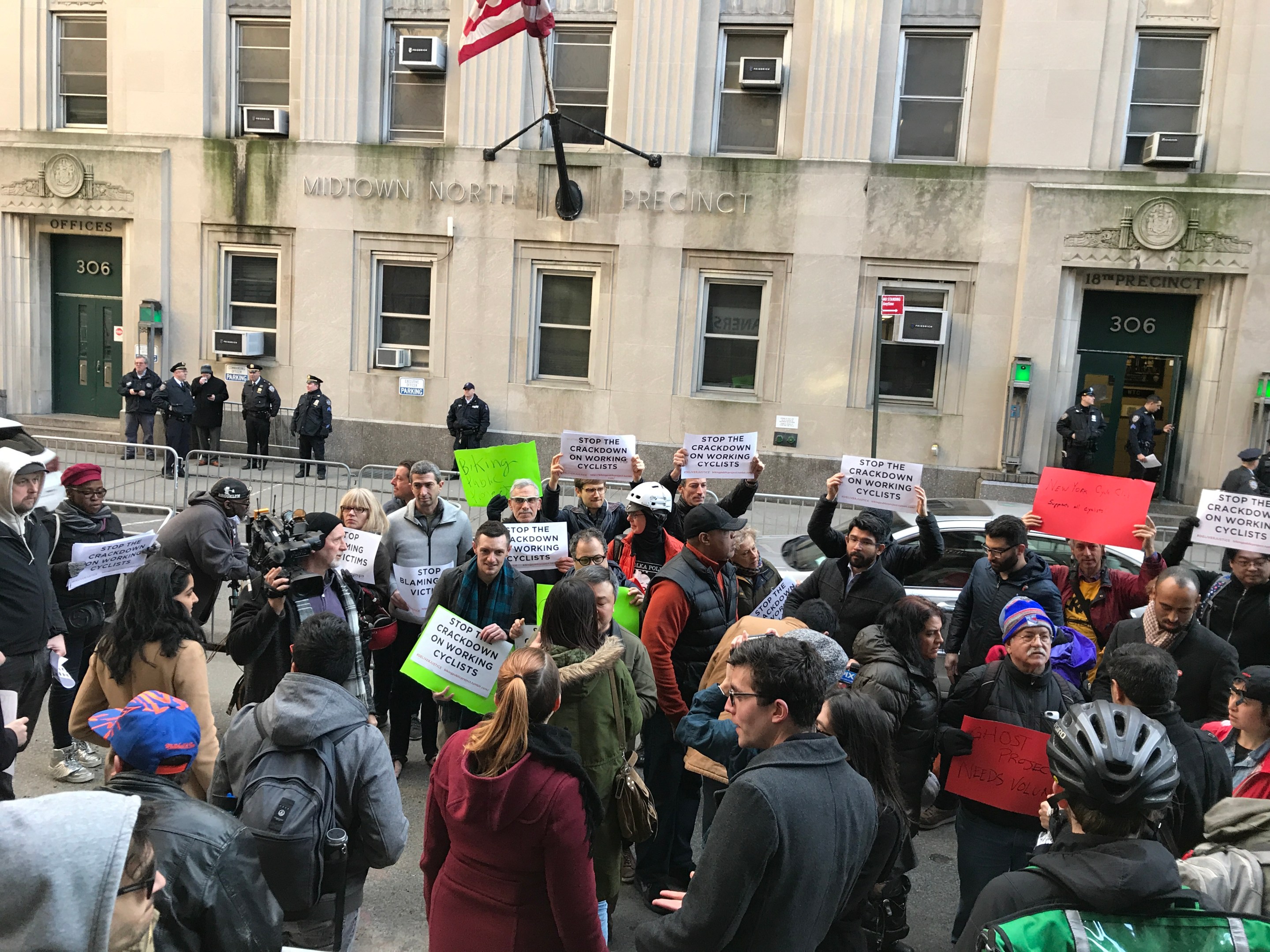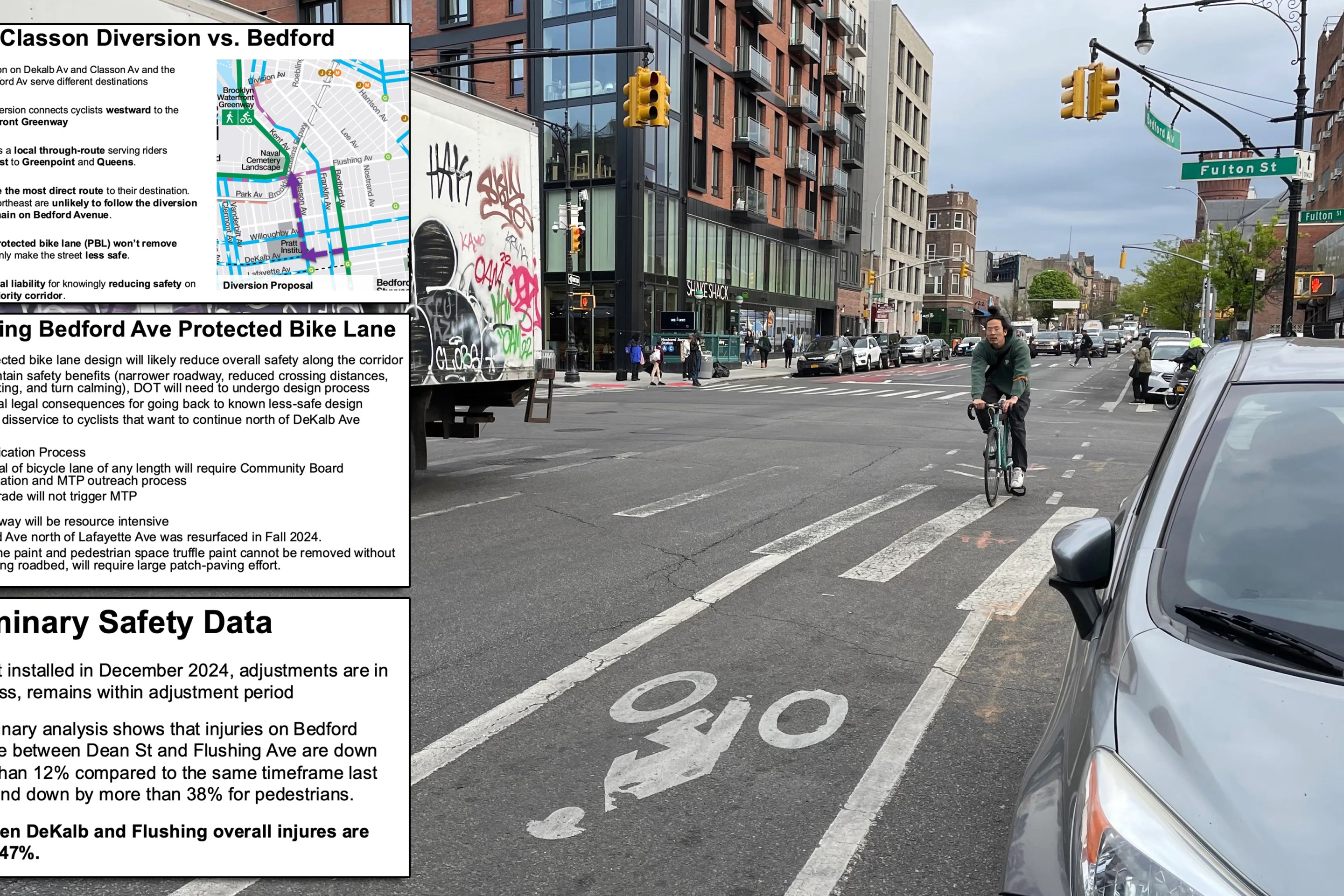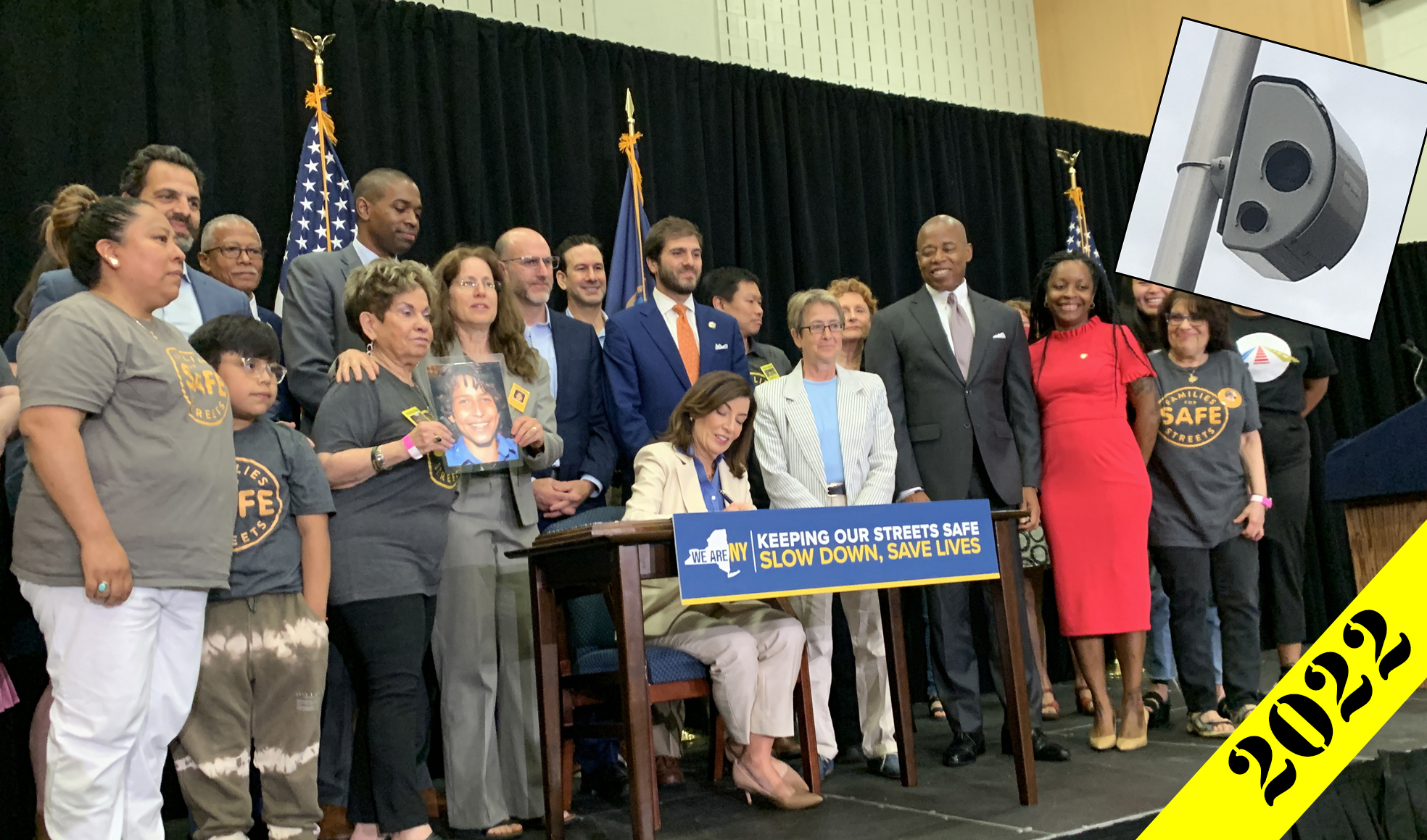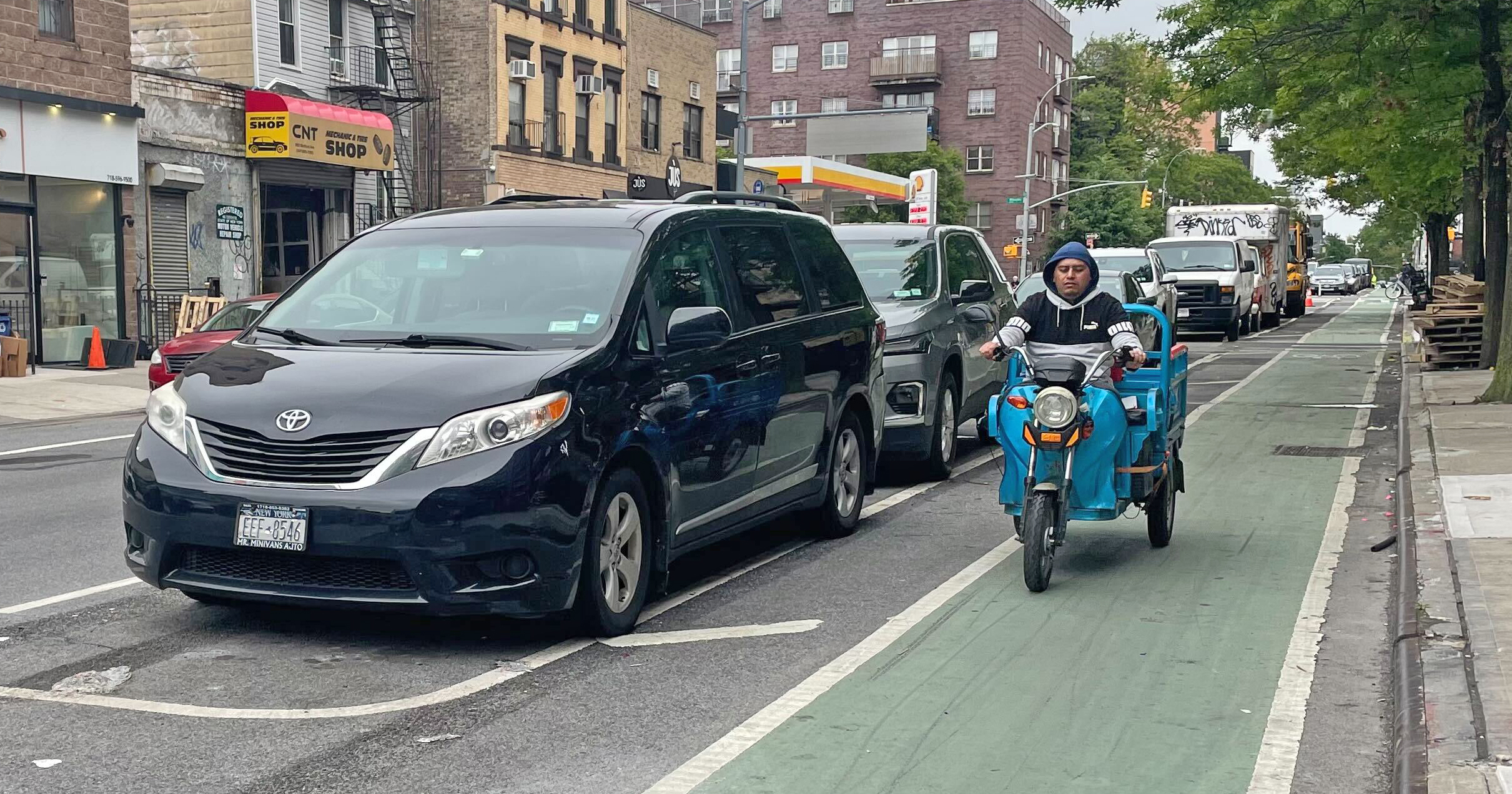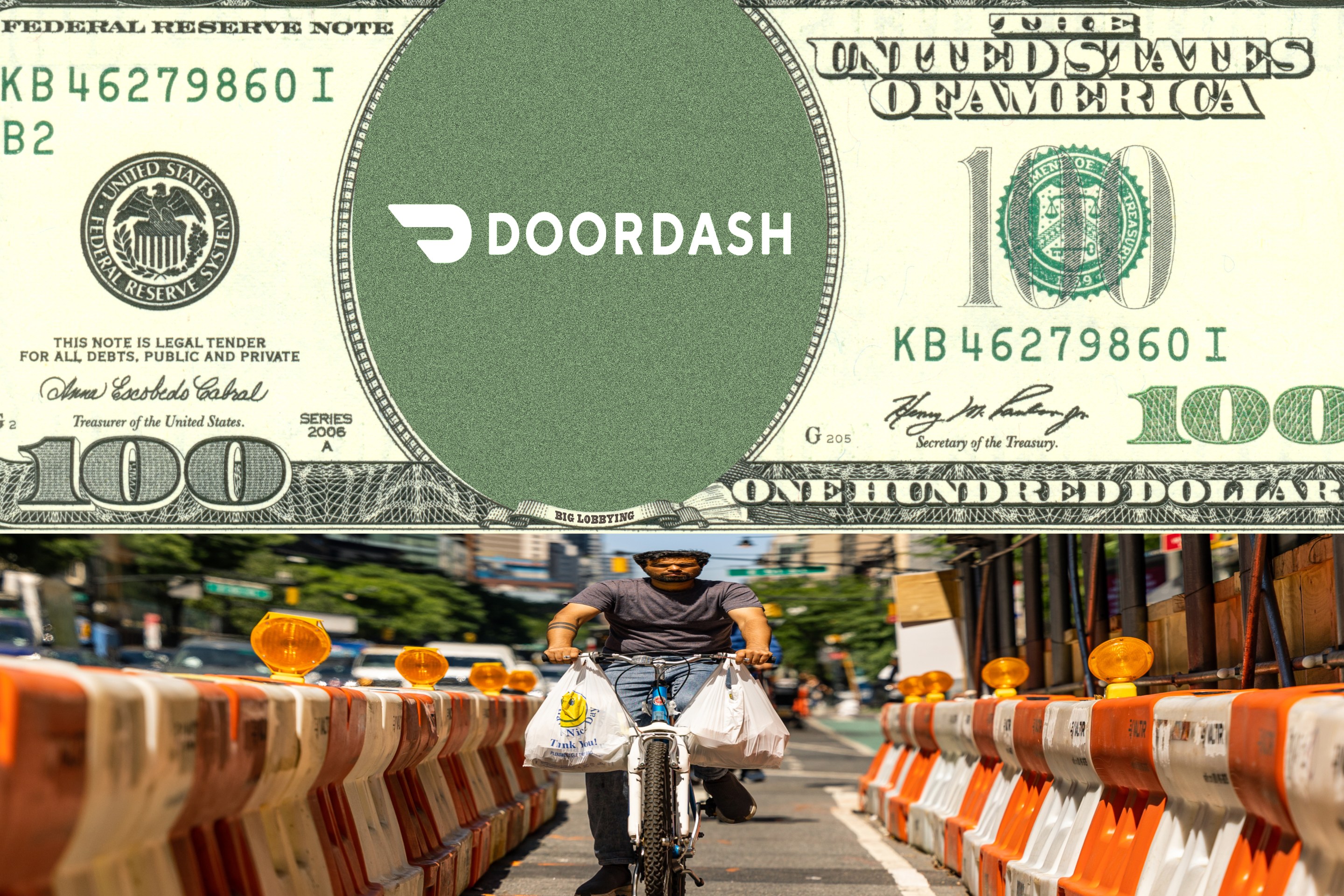Now we know why Mayor de Blasio has never provided statistics to back up his contention that e-bikes are so dangerous that they must be confiscated from poor delivery workers: the data simply do not confirm his anecdotal fear-mongering.
According to the city’s NYPD Motor Vehicle Collisions database, just 31 of the reported 45,775 motor vehicle collisions that resulted in injuries last year were caused by e-bikes. That's roughly .07 percent. And e-bikes injured 32 people in all — or just .05 percent of the 61,939 injuries.
In all, 11,115 pedestrians were injured in 2018. Just nine of them were struck and hurt by an e-bike rider, the statistics show. Again, that is a tiny fraction of one percent.
The data was initially compiled by Biking Public Project organizer Do Lee and Legal Aid Society Research and Data Quality Analyst Alex Rhodd, then confirmed independently by Streetsblog. Advocates say it confirms what they have been saying all along about the mayor's e-bike crackdown: It is based on a lie and it betrays de Blasio's claim that New York is "America's fairest city."
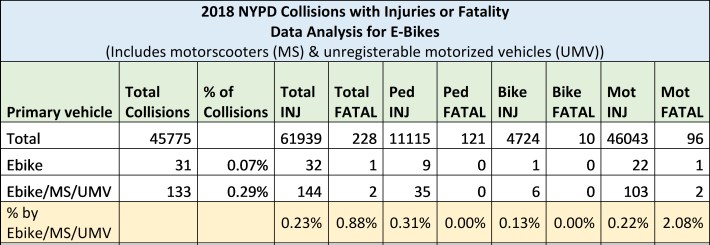
"The data don't show that e-bikes are especially dangerous, and that the enforcement against the predominantly immigrant food delivery workers seem intended to placate some community residents who are frightened or annoyed by e-bikes,” said Steve Wasserman, a staff attorney with the Legal Aid Society’s Special Litigation Unit.
It's not easy to get the NYPD to release any information about the e-bike delivery men they have been cracking down on since 2017, so Lee and Rhodd looked at the city's crash data line by line, poring over how the NYPD classified the primary vehicle in all of the 45,775 more serious collisions.
The vast majority of injury-causing crashes — more than 99.6 percent, in fact — are caused by car drivers. But buried in the crash data are seven codes that officers use to log a crash caused by an e-bike: e bik, e sco, e/bik, e-bik, ebike, elect, and e-mot.
Using those, the researchers found just how few crashes and injuries were attributed by the NYPD to e-bikes.
The numbers are even more startling when you take out the injuries that e-bike riders caused to themselves. Twenty-three of the 32 injuries caused by e-bike riders were to the cyclist themselves. Drivers killed 121 pedestrians last year. Not a single pedestrian was killed by a cyclist — on an electric-powered bike or a regular bike. Zero.
Police officers do have two additional classifications for crashes that may implicate e-bike riders, Lee and Rhodd said: MS (motor scooter) or UMV (unregisterable motor vehicle). But even when Lee and Rhodd added in crashes with those codes for the primary vehicle, the number of collisions and injuries rose only by 133 crashes. Even if combined with the 31 crashes labeled with one of the seven "e-bike" codes, these crashes only constitute .3 percent of all the injury-causing crashes in 2018.
“It’s such a tiny percentage of crashes and collisions and the actual injuries is tinier, whether to pedestrians or otherwise,” said Lee, who is also a researcher at Queens College. “Looking at the data, it’s mostly e-bike riders getting hurt.”
The data is the city's own, but that hasn't prevented the mayor from consistently justifying his crackdown based on an alleged safety issue. His rhetoric against e-bike-using delivery men began in earnest in a comment on WNYC's "Ask the Mayor" show in October, 2017:
This is about safety and this is about quality of life. And it’s also about changes that we’ve seen in our neighborhoods and the things we have to do to address those changes...what we saw was a growing safety problem. And I’ve had a lot of people at town hall meetings say to me that they are concerned that they want to make sure we address reckless behavior by these electronic bicycles. Electronic bicycles have emerged over the few years as more and more of a problem particularly in some of our mostly populated neighborhoods.
He's reiterated that position this January:
Right now, one — we all know that the e-bikes are not legal. ... And one of the central reasons for that is the e-bikes go a lot faster. We have to have a way to address the speed of the e-bikes. We’ve got to get the safety piece right. That is my central concern. And until I see something that ensures safety I’m not going to be comfortable.
In February, he again cited unspecified fear of e-bikes:
And for all of the people out there who feel vulnerable crossing streets – and I’ve talked to a whole lot of them – they are not ideologically motivated, their speaking from their life experience.
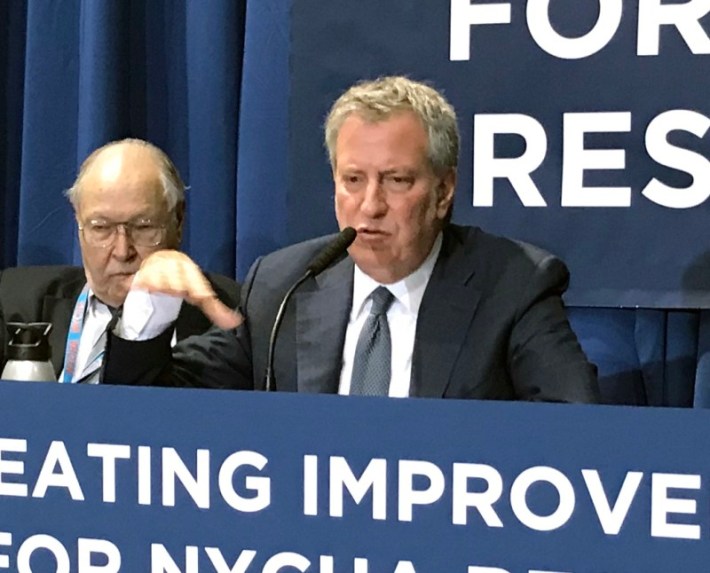
The mayor puts delivery workers' lives at risk when he continues to claim that electric bikes — which are used by thousands of low-paid workers to deliver food to wealthier New Yorkers, including cops — pose a threat to pedestrians, said Lee.
“Why are they repeating these very damaging fear-mongering narratives about mostly immigrant workers when it’s not supported by what data shows?” he said. “It’s absolutely reprehensible to foster anti-immigrant sentiments.”
The mayor’s anti e-bike comments are frequently echoed by other politicians — State Senator Liz Krueger of Manhattan, for instance, quietly put the kibosh on legislation that would have allowed localities to decide for themselves about the legality of the vehicles, giving in to and repeating unjustified fears about the bikes.
“Senator Krueger does not feel that Manhattan streets and bike lanes can handle throttle e-bikes or e-scooters,” her spokesman told Streetsblog last week. A city council bill to legalize e-bikes is stalled.
Meanwhile, every delivery person whose bicycle is confiscated by police pays weeks of wages to get the bike back. Hundreds have been seized by the NYPD in the crackdown.
"We are very angry about the crackdown," delivery worker Deqing Lin told Streetsblog last year. "For us, without e-bikes, we will first lose our jobs, because we are too old to ride bicycles to make deliveries for 10 hours. Our families will be in trouble. When I ride a regular bike, I barely earn enough money to pay my rent.
"The mayor has no idea about our work," added Lin, who can earn as little as $50 a day.
The city should listen to its own data — not give in to people’s unjustified fears to crack down on our society’s poorest and most vulnerable workers, added Lee.
“I know that people can feel uncomfortable when new vehicles are introduced on the street, workers are in a hurry, they way they are positioned on the street, they’re closer to the pedestrians, but it doesn't mean they actually hurting people," he said. "Discomfort does not mean actual data.”
The mayor’s office declined to comment on the data and again repeated his fear mongering that the vehicles are dangerous.
“As the mayor has said, we are looking into potential solutions on e-bikes, but safety will always be our number one priority,” said City Hall spokesman Seth Stein.
An NYPD spokesperson also declined to comment on the data, but said cops may be classifying electric bikes in ways beyond the seven e-bike codes or the additional classifications "motor scooter" or "unauthorized motor vehicle." Because the vehicles are all illegal, the department can't be sure if officers are logging the crashes in other ways. As such, the agency still claims that the number of collisions caused by electric bike is higher.
Again, however, the department did not offer any statistics to back up that claim.
